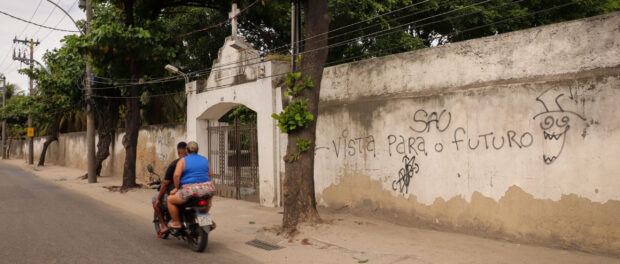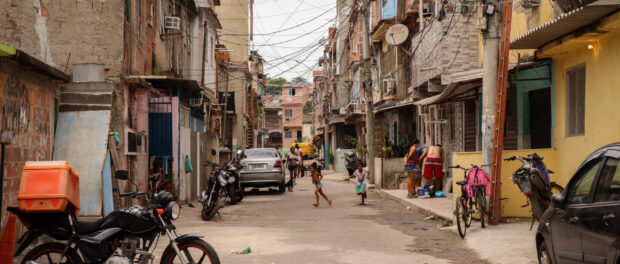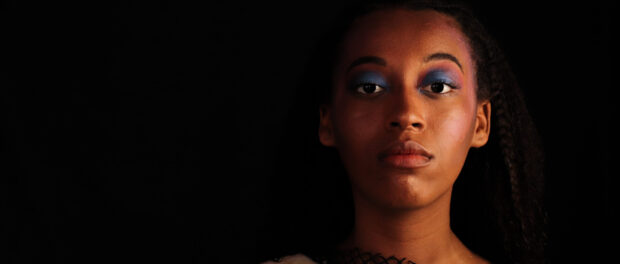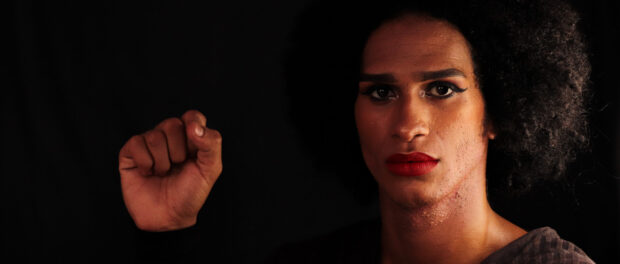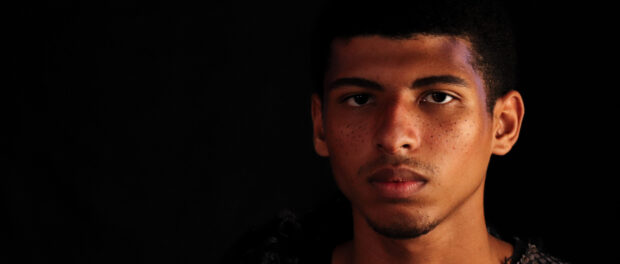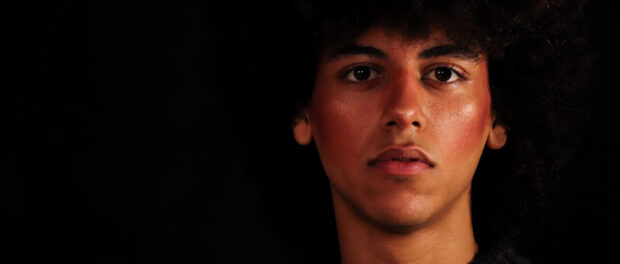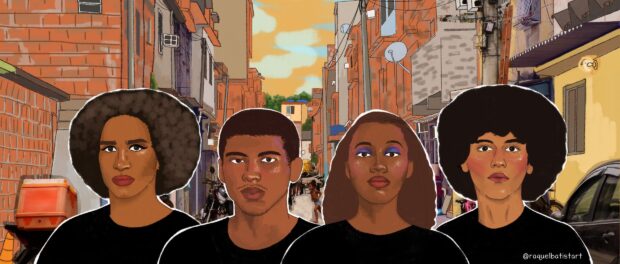
This article is the latest contribution to our year-long reporting project, “Rooting Anti-Racism in the Favelas: Deconstructing Social Narratives About Racism in Rio de Janeiro.” Follow our Rooting Anti-Racism in the Favelas series here.
Past and Present in Caju
To get to Complexo do Caju, you need a bit of focus, especially because you can’t get there without passing through the cemeteries where, since the beginning of the pandemic, those who pass by witness scenes that the general population had only seen on the screens of their televisions and cellphones. Barren streets give way to the favela entrance, hot and heavy with humidity. Streets are covered with dust kicked up by passing trucks heading to the Port Region and the adjacent Avenida Brasil.
The atmosphere of these streets changed during the largest health crisis in world history—the coronavirus pandemic—and all of the consequences that came along with it. Hundreds of thousands of deaths have been seen in Brazil, and in Rio de Janeiro the number still climbs daily.
Because of the growing lack of space in cemeteries, two-story buildings were constructed to house vertical tombs, which can be seen from the rooftops of many homes in Complexo do Caju—like Sebastião’s, for instance, which is only separated from the cemetery by a wall.
The neighboring Port Region was once synonymous with wealth, especially after the opening of the port in 1808 to countries that were friendly with Portugal, which broke the previous colonial trade pact and mainly favored England. The Portuguese royal family’s flight to Brazil, as they fled Napoleon, made Rio de Janeiro the new capital of the Portuguese Empire, which was subsequently flooded with English products and enslaved people who kidnapped from Africa. The consequences of this process are still playing out today in Rio de Janeiro, the largest slave port in world history.
Caju was a witness, then, to the establishment of the largest slavocracy in the Americas at the Cais do Valongo, in the adjacent neighborhood of Gamboa. However, this characteristic of the region’s history was almost buried over the following 150 years, both by time and socio-spatial transformations.
Today, Caju is forgotten by many, seen as an urban periphery—a collection of favelas. This change in the neighborhood’s character began just prior to 1810. Caju began to be populated by poor Afro-Brazilians migrating to areas close to Rio’s downtown Centro, the wealthy area where they worked. The city had no public housing policy for this population, much less any support for them to find alternatives. As a result, residents’ generated their own occupations, generating spaces which, from the point of view of the State, shouldn’t receive any social investment, improvements, or public policies; which shouldn’t even exist as part of the city’s landscape.
Today Complexo do Caju is comprised of seven favelas: Parque Alegria, Clemente Ferreira, Quinta do Caju, Chatuba, Parque São Sebastião, Manilha, and Parque Conquista. The State neglects many aspects of these favelas, and a lot is missing. One aspect that stands out is the lack of opportunity for residents’ social and cultural development. Even so, many young people in Caju are drawn to the arts. There is currently a high-energy movement created by youth in these communities, who live conditions that barely allow them to survive—and which were amplified by the pandemic.
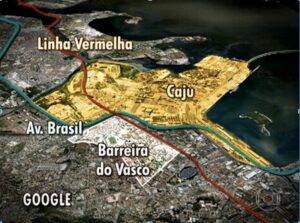 To understand how young talents are sprouting in the hard day-to-day reality of Caju, we highlight the stories and reflections of four local youth: Vitoria Silva, Katia Dami, Pedro Henrique Bento and Dave Braskintoven. They are part of the only theatrical project in Complexo do Caju, Projeto Cria. They came to know each other through theater, and that is how they organize themselves socially. They are multitalented artists who distinguish themselves through art, while still fighting for the basics, for what should be possible for young black people from the favela: to be able to be who they are and to live in peace in their communities. Their identities extol not only the place they belong to, but also the position of those who need to assert themselves every day in the midst of a racist and anti-favela society.
To understand how young talents are sprouting in the hard day-to-day reality of Caju, we highlight the stories and reflections of four local youth: Vitoria Silva, Katia Dami, Pedro Henrique Bento and Dave Braskintoven. They are part of the only theatrical project in Complexo do Caju, Projeto Cria. They came to know each other through theater, and that is how they organize themselves socially. They are multitalented artists who distinguish themselves through art, while still fighting for the basics, for what should be possible for young black people from the favela: to be able to be who they are and to live in peace in their communities. Their identities extol not only the place they belong to, but also the position of those who need to assert themselves every day in the midst of a racist and anti-favela society.
Vitoria Silva
“Discovering myself as a black woman was really difficult because I used to be extremely shy and oppressed, and I thought I was strange. But I never was the standard and never did let myself be put into a box. Until one day something that I couldn’t ignore happened, and it made me question my position in society. It made me realize that if I don’t make myself meet challenges head-on and I’m not unique, I’m going to be beaten down because I’m not in any way privileged. I’m poor, and I’m black. So at that particular moment when I decided to accept myself, I started to express myself, I stopped oppressing myself. Nowadays, when someone starts with their prejudices, I lash out for real, and it happens a lot. I like the person I’ve become; someone who doesn’t hide and who speaks up. I even challenge the people in my own family. Now, I can assert myself.
I see theater as a way to express myself. I have fun with myself. Theater is a way of passing on a message to someone else in a beautiful or in a tough way, but they’re going to get the message. It’s a way to share my life experience, or someone else’s but through my perspective. It’s a way for me to be heard, which I wouldn’t be in many other situations. Nowadays, we have lots of actresses as references, black actresses, but I didn’t have any references. In my family no one even knew what theater was, I was the first.
I was able to follow all the processes of creating theater, from putting on the show to acting. I went through all the phases of production and I saw what I really liked. Before that, I was an extremely timid person, I opened up to very few people. I had a really hard time speaking up, figuring out what I wanted to say. When I tried to present my work at school, I’d choke up from embarrassment. I joined Passenger of the Future and really liked it, and I stayed on for two years. Right after that, the pandemic hit.
I’ve always liked to play more historic roles, characters that are older than me. But I had never played a role with much representation, because when I look at Carolina de Jesus, I feel like I’m looking at my mother, you know? It’s a crazy experience, because my mother has worked ever since she was eight years old. My grandparents died young and they had ten children. So my mother had to spend her whole life raising and taking care of people. When I look at Carolina raising her children, playing so many roles in her life, she becomes a person that I want to be one day. She’s power, she’s a reference. A black woman from the favela. I look at her and I see an inspiration, and when I leave the house, I see a lot of Carolinas around here.”
Katia Dami
“Katia emerged as a character in theater classes on makeup that I used to take, when the instructor led a philosophical discussion in which we tossed around names in this hot-potato-like game. One boy, who is gay, gave his adopted name, Ariel. When everyone called me Leandro, my given name, I said ‘Leandro? Who’s Leandro? My name is Katia!’ Everybody laughed, and it even became a meme. So I started to perform under that name.
I’m very accessible, very diverse, and I’ve constructed myself from many elements. But the image of a woman I really resonate with is my mother’s. She was always a nice woman, humble, interesting, honest and frequently complimented. She was an incredible woman and now people say that she’s living on through me. Today I’m a sister and a mother all at once, and that’s a responsibility that came out of nowhere. I had to leave my youth behind when I was 19 and required to constitute a family with two small children without having any [living adult] relatives in Rio, which was really complicated. You have to hustle, find money, provide for everything, put food on the table the next day, and at the same time think about a professional artistic career. And there are many other details to take care of as well. My mom was from Pernambuco and my father from Piauí, and I am a mixture of them surviving here alone and raising two children.
I had my first contact with the theater in 2012 at the Zona de Cidadania. I took classes in dance and arts and crafts, among other things, because I have many sides. I started there the same year that the project was ending. Then, I heard about Passenger of the Future through Afroreggae, that recommended me for theater classes because I was very talented. I was in Auto da Compadecida in 2015 and my performance was so good that I kept on taking classes. In 2016, I played my first woman’s role around the same time I became Katia. I played the character of Maria Belezoca in Tribobó City. Then, in 2017, I was in Mom Baby, which told the story of street circuses, taking theater to the people. At the same time, I was introduced to political theater, focusing on the periphery. And I concluded that was what I wanted to dedicate my life to.
Theater gave me self-esteem, self-confidence, it made me the powerful person that I am today. I discovered myself thanks to theater and it’s given me strength to believe ‘go ahead, the world is yours.’ I was a goddess and I didn’t know it. Besides all that, theater developed my bodily expression, my posture, my voice. You start looking at everything that goes through your head with a critical eye. Art is really important because it develops your intellect. I invest a lot in the things that I do, and today I’m a model, composer, singer, actor, makeup artist, performer, drag queen, poet, prop maker and many other things.
To be trans in a country that is transphobic, a country with the highest rate of murders of transvestites and transsexuals, is very difficult. If I slip up while I’m out, I could easily be killed and I’d leave two children all alone. I talk a lot about being resilient in this society, like we are here in Caju. How do you fight the looks that kill, the ones that make you cringe because they’re so charged with prejudice? People judge a lot and at the same time it’s really hypocritical because they yell at us in the streets, and then contact transvestites via WhatsApp. Brazil is really hypocritical. Look at me: I’m a goddess surviving in paradise.”
Pedro Henrique Bento
“I didn’t hang around in Caju very much until the day my mother made me join Afroreggae. When I got there, for the first week, my mom stayed in class with me because she knew I would run away. My classes were circus and graffiti art. Then I noticed the children playing percussion and I wanted to do that, too. It was three years before I discovered theater. At the beginning, it was strange, but little by little I started to like it, I lost my negative attitude and saw that it helped me forget my problems, it helped me get rid of the feeling that every day was terrible. My diction got better and I started to hold more conversations. Katia was the first person I met there, at Afroreggae. She took dance class, she’s such a spontaneous person—she practically adopted me.
When Afroreggae closed down in Caju, I joined a project that had a different feel, that wasn’t so childlike. That’s where I met Dave. The organizer was handing out pamphlets at school and I signed up. I liked this project even more because it was there that I got interested in art itself. That year I also met Vitoria in line at the canteen.
The theater gave me the world that I didn’t have before. I got to know more people, got to listen to their stories and to understand their battles. I met people and made incredible friends and got to know what went on in other people’s homes. I opened up my mind to understand A, B, and C. Theater is a unique experience, one everyone should try. It’s incredible because you kind of liberate yourself from your robotic life, from the standardized world, you know?
I never suffered anything for being bisexual. I was never bullied because people were more afraid of me than I was of them. Racism, yes, sure. Things were always very clear for me in my own mind, so much so that I used to speak with my mother and she said she was fine with all of that. My mom supported me in everything, I always tell her everything that happens. But if it wasn’t for the Internet and for the computer that I got, I would never have known about or deepened my understanding of LGBT issues and racism. So much so that when I met Katia I already knew how to debate, I already knew a bit about things because I had seen and studied them on the Internet.”
Dave Braskinovten
“I used to watch a lot of Quinta Categoria on MTV, Tatá Werneck and all of them. When I was younger, my sister and I used to make up skits, improv, we’d imitate people. I was always active at home or outside, my mom always had me in some sort of activity. But when my cousin and my godmother came from Paraíba to perform in a play at the old Usina de Cidadania, in Manguinhos, everything changed. They presented a dance program and I always went to rehearsals. I was nine years old. I really wanted to be in a show, but I had to wait until I was eleven to join. I started to do theater and it was marvelous because I’d always been a free kid, I liked to joke around, talk to everyone. I did three plays and then ended up not doing any more theater because the Usina da Cidadania was closed down [by Governor] Sérgio Cabral. In 2015, I started to rehearse with the Passengers of the Future project. In the beginning, there were a lot of people but over time there were fewer and fewer until it was just me and two others in the school. In my fourth year, I became a monitor and met Pedro and Vitoria.
For me, the theater represents freedom and a lot of learning, because theater takes each person as an individual that needs to be heard, that needs to speak, that needs to transmit something, like their art. When you play a role based on a real person, for example when Vitoria played Carolina Maria de Jesus, you can get through to people who never really listened before and tell a story. This touches both the person who is listening and the actor who is speaking. It’s a kind of sharing that is so necessary, a way for everyone to listen to each other.
An important moment for me was when I let my hair grow out. That’s when I really understood that I was black, that that is my ancestry. I thought I was white—and since my hair is curly, in the favela, I was labelled white. But whenever I left to the formal city, to the ‘asphalt,’ I was seen differently. I’d notice people looked at me strangely, that they wouldn’t sit beside me. I was seen as this terrible thing because of my hair. That’s when I decided to let it grow out even more. My hair is the only black feature I have, it shows my ancestry. It’s my element of power. I think it’s really sad that even in 2021 we have so much racial prejudice, xenophobia, discrimination, and hate speech.”
Conclusion
Artistic productions, especially peripheral street theater, are tools that can be used to demand social change. They carry, in themselves, an enormous potential for transformation. Art can stimulate the creation of a collective sense of belonging, which hones the ability to question, to voice, to organize and create movements in and for a specific territory. As the testimonials above illustrate, through culture, it is possible to break down many of the different barriers imposed on black, poor, peripheral populations.
Through community-generated social movements, and especially through the awareness that always follows social or cultural mobilization, especially through popular culture, it is increasingly evident that change is necessary, urgent, and will only come through community action. Caju is a bunker of potential, with talents that are taking their place in history, making crucial demands such as equality, human rights, and freedom of expression.
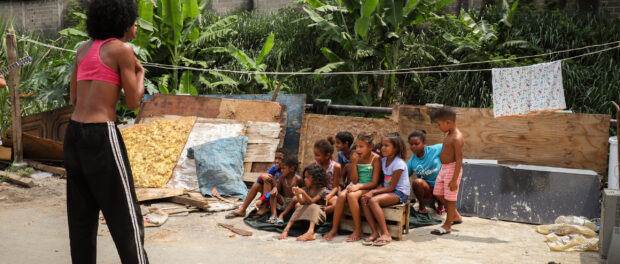
About the author: A resident of Lins, in Rio’s North Zone, Alexandre Cerqueira has a degree in International Relations and develops primary education projects in favelas using photography and video production as language tools.
About the artist: An undergraduate at the Federal University of Rio de Janeiro’s (UFRJ) School of Fine Arts, Raquel Batista, 19, was born and raised in Campo Grande and currently lives in Engenho de Dentro, in Rio’s North Zone. A visual artist who works as a photographer and illustrator, her goal is to use art to represent people who, like her, a young black woman from the periphery, are not always seen.
This article is the latest contribution to our year-long reporting project, “Rooting Anti-Racism in the Favelas: Deconstructing Social Narratives About Racism in Rio de Janeiro.” Follow our Rooting Anti-Racism in the Favelas series here.

